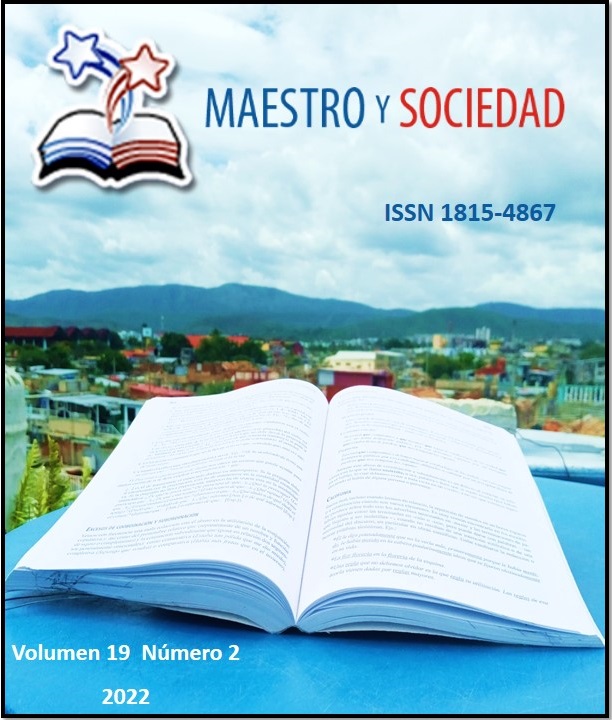Impact of virtual education in the teaching of the English language in higher technology careers at the Instituto Superior Tecnológico La Maná
Array
Keywords:
COVID-19, virtual education, English language, teaching-learning process, information and communication technologiesAbstract
The objective of the research is to analyze the impact of virtual education in the teaching of the English language in higher technology careers at the Instituto Superior Tecnológico La Maná, in Ecuador. The study has a qualitative approach, with a descriptive scope and a non-experimental design, which included an educational intervention to 86 students of the institute in question for the analysis of the impact produced by virtual education in the teaching of the English language. A documentary analysis was carried out based on the use of the PRISMA methodology and a questionnaire was developed as a tool for collecting information from the student body that participated in the educational intervention. The results obtained evidenced the positive impact that virtual education had on the teaching of the English language, although it enabled a better development of reading and listening comprehension skills, as well as oral and written expression.
References
2. CEPAL. (2020). La educación en tiempos de la pandemia de COVID-19. Repositorio digital de la Comisión Económica para América Latina y el Caribe. https://repositorio.cepal.org/bitstream/handle/11362/45904/1/S2000510_es.pdf
3. Clemente-Suárez, V. J., Navarro-Jiménez, E., Moreno-Luna, L., Saavedra-Serrano, M. C., Jiménez, M., Simón, J. A., & Tornero-Aguilera, J. F. (2021). The impact of the COVID-19 pandemic on social, health, and economy. Sustainability, 13(11), 6314. https://doi.org/10.3390/su13116314
4. Cáceres-Piñaloza, K. F. (2020). Educación virtual: Creando espacios afectivos, de convivencia y aprendizaje en tiempos de COVID-19. CienciAmérica, 9(2), 38-44. http://dx.doi.org/10.33210/ca.v9i2.284
5. Daniel, J. (2020). Education and the COVID-19 pandemic. Prospects, 49(1), 91-96. https://doi.org/10.1007/s11125-020-09464-3
6. Espino-Díaz, L., Fernández-Caminero, G., Hernández-Lloret, C. M., González-González, H., &Álvarez-Castillo, J. L. (2020). Analyzing the impact of COVID-19 on education professionals. toward a paradigm shift: ICT and neuroeducation as a binomial of action. Sustainability, 12(14), 5646. https://doi.org/10.3390/su12145646
7. Giatman, M., Siswati, S., & Basri, I. Y. (2020). Online learning quality control in the pandemic Covid-19 era in Indonesia. Journal of Nonformal Education, 6(2), 168-175. http://dx.doi.org/10.15294/jne.v6i2.25594
8. Grigoryev, L. M., & Grigoryeva, N. L. (2021). US economy and social structure before the change of eras. Voprosy Ekonomiki, 98-119. https://doi.org/10.17537/2020.15.441
9. Hashim, M. A. M., Tlemsani, I., & Matthews, R. (2021). Higher education strategy in digital transformation. Education and Information Technologies, 1-25. https://link.springer.com/article/10.1007/s10639-021-10739-1
10. Hernández-Sampieri, R., & Torres, C. P. M. (2018). Metodología de la investigación. McGraw-Hill Interamericana. https://apunteca.usal.edu.ar/id/eprint/1134/
11. Hinestroza, M. G., Sánchez, M. S., Kure, S. I., & Machado, M. C. M. (2019). Competencias profesionales del docente universitario desde una perspectiva integral. Killkana sociales: Revista de Investigación Científica, 3(1), 1-14. https://dialnet.unirioja.es/servlet/articulo?codigo=7019215
12. Kundu, A., & Bej, T. (2021). COVID 19 response: An analysis of teachers’ perception on pedagogical successes and challenges of digital teaching practice during new normal. https://doi.org/10.1007/s10639-021-10503-5
13. Marinelli, H. A., Ortiz, E. A., Bergamaschi, A., Sánchez, A. L., Noli, A., Guerrero, M. O., ... & Rivera, M. C. (2020). La educación en tiempos del coronavirus: Los sistemas educativos de América Latina y el Caribe ante COVID-19.
14. Ortega, J. G. C., Pérez, J. F. R., & González, R. C. (2021). El impacto de los recursos educativos abiertos en la socialización del conocimiento en el sistema educativo ecuatoriano. Serie Científica de la Universidad de las Ciencias Informáticas, 14(6), 59-71. https://publicaciones.uci.cu/index.php/serie/article/view/890
15. Paredes, T. C. H. (2021). Aplicaciones móviles y recursos educativos digitales para el aprendizaje matemático en estudiantes de bachillerato intensivo. https://repositorio.pucesa.edu.ec/handle/123456789/3380
16. Pérez, J. F. R., Torres, V. G. L., Castillo, S. A. H., & Valdés, M. M. (2021). Lean Six Sigma e Industria 4.0, una revisión desde la administración de operaciones para la mejora continua de las organizaciones. UNESUM-Ciencias. Revista Científica Multidisciplinaria, 5(4), 151-168. https://doi.org/10.47230/unesum-ciencias.v5.n4.2021.584
17. Rivera, J. J. Q. (2020). El Efecto del COVID-19 en la Economía y la Educación: Estrategias para la Educación Virtual de Colombia. Revista Scientific, 5(17), 280-291. https://doi.org/10.29394/Scientific.issn.2542-2987.2020.5.17.15.280-291
18. Ruiz, L. E. C. (2021). Factores de riesgo de deserción escolar durante la pandemia (Covid-19) en la Unidad Educativa "12 de noviembre" del cantón Píllaro. http://repositorio.uta.edu.ec/handle/123456789/33753
19. Shah, S. S., Shah, A. A., Memon, F., Kemal, A. A., & Soomro, A. (2021). Aprendizaje en línea durante la pandemia de COVID-19: aplicación de la teoría de la autodeterminación en la ‘nueva normalidad’. Revista de Psicodidáctica, 26(2), 169-178. https://doi.org/10.1016/j.psicod.2020.12.004
Published
How to Cite
Issue
Section
License
This journal provides immediate open access to its content, based on the principle that offering the public free access to research helps a greater global exchange of knowledge. Each author is responsible for the content of each of their articles.



























 Universidad de Oriente
Universidad de Oriente 